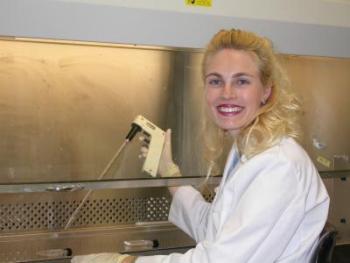Marissa Nichole Rylander, who serves as Director of Tissue Engineering, Nanotechnology, and Cancer Research Laboratory at Virginia Tech, has won the 2012 Y.C. Fung Young Investigator Award for her contributions in the biomedical engineering field from the Bioengineering Division of the American Society of Mechanical Engineering.
 Marissa Nichole Rylander is the director of Virginia Tech's Tissue Engineering, Nanotechnology, and Cancer Research Laboratory (Credit: Virginia Tech Research).
Marissa Nichole Rylander is the director of Virginia Tech's Tissue Engineering, Nanotechnology, and Cancer Research Laboratory (Credit: Virginia Tech Research).
Rylander, who has been serving as a faculty at Virginia Tech since 2006, is carrying out advanced research in tissue regeneration, cancer engineering and nanomedicine. She won the CAREER Award from the National Science Foundation in 2010 for her research on tumor development using dynamic imaging, nanotechnology and laser therapy technologies to develop advanced cancer therapies.
With the CAREER grant, Rylander will extend her research on the application of an innovative sensing system known as the ‘holey scaffold’ co-invented by her. This patented equipment is the first-its-kind system that can perform non-destructive, light sensitive, minimally invasive molecular sensing and manipulate transport and biological processes inside live organisms.
Rylander stated that holey scaffold can be imagined as a tiny microscope that is compatible with a live organism. It is developed from scaffolding of tissues and is incorporated in a hollow microchannel network. The scaffold made of biological material or biodegradable synthetics such as collagen encourages tissue growth, she said.
Rylander utilizes the scaffold to detect production of reactive oxygen species, HSP expression, cell viability, temperature and dynamic mass transport of nanoparticles in real-time within a vivo tumor inside a mouse or an in vitro tumor within a bioreactor. She utilizes several types of nanoparticles such as carbon nanotubes, carbon nanohorns, unique embodiments of fullerenes and carbon nanotubes along with laser irradiation. Her objective is that clinicians can use her treatment model to detect suitable laser parameters and nanoparticle properties to realize selective and efficient cancer therapy.